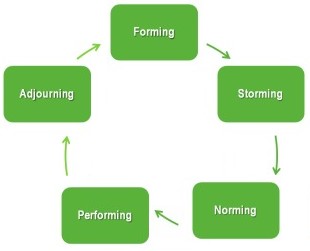When a number of individual’s begin to work at inter-dependent jobs, they often go through several stages as they learn to work together as a team. These stages are not strictly followed, but they do symbolise a broad pattern that may be observed and forecasted in many settings across the team’s time together. The stages are the result of questions and issues that the team predictably faces. In addition, members want to know which rules to follow and what each person should contribute.
Life cycle of a team can be illustrated as help in the form of a diagram:

The typical stages in a team’s evolution are
- Forming: Members share personal information. Start to get to know and accept one another and begin focusing their attention towards the group’s tasks. An area of courtesy prevails and interactions are often cautious.
- Storming: Members compete for status, jockey for positions of relative control and agree about suitable directions for the group. External pressures interfere with the group and tensions rise between individual’s as they assert themselves.
- Norming: The group begins moving together in a co-operative fashion and a cautious balance among competing forces is struck. Group norms emerge to guide individual Behavior and co-operative feelings are increasingly obvious.
- Performing: The group matures and learns to handle complex challenges. Functional roles are performed and fluidly exchanged as needed and tasks are effectively achieved.
- Adjourning: Even the most successful groups, -committees and project teams break up sooner or later. Their breakup is called adjourning which requires dissolving intense social relations and returning to permanent assignments. The adjournment stage is becoming even more common with the advent of flexible organizations, which feature temporary groups.
Advising teams of these likely stages can be beneficial to group members and their leaders. Awareness by all team members can help them greater understand what is happening and work through the issue involved. Groups are always different of course; consequently, not all teams will clearly experience all the stages of the life cycle. Some groups may be temporarily “stuck” in a certain stage, and others may find themselves going back to an earlier stage from time to time. To progress their own development, team members may find it useful to know what elements help create successful teams.

